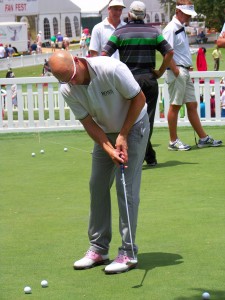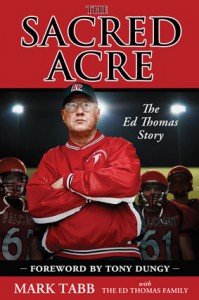Click “Like” to share this with your friends!
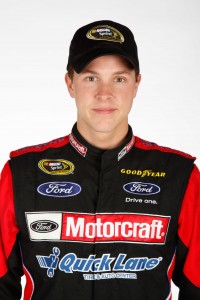
It was early October 2010 when I first met Trevor Bayne. He was already a rising star within the NASCAR ranks but a surprising move left him jobless leading up to the race in Kansas. But just days after Michael Waltrip Racing let Bayne go, Roush-Fenway Racing added him to the roster and put him in the #16 car, the team for which he continues to race today.
What a difference 12 months (plus a week) can make in the unpredictable world of stock car racing. Since that first interview, Bayne has become a household name by winning the Daytona 500 for the legendary Woods Brothers in the #21 car. He made history in the process becoming the youngest driver (age 20) to win NASCAR’s biggest race.
But the journey has been anything but smooth. During the spring, Bayne contracted Lyme disease from a spider bite and was knocked out of competition for five weeks. It was so serious, he was sent to the Mayo Clinic for treatment. During that time, Bayne remained upbeat and even stayed involved in a weekly Nationwide Series Bible study via conference call.
I had a chance to catch up with Bayne, once again in Kansas, to find out what the last 12 months have been like, how his faith has sustained him through the crazy times and how that Bible study group is making a difference:
Chad Bonham: How would you describe the last 12 months of your life?
Trevor Bayne: Well, there’s been a lot of ups and a lot of downs, and they kind of balance each other out to somewhere in the middle. Last year, this race was the first time I was with Roush-Fenway Racing. I had no idea what was going to happen in the future. I had no idea I’d run the 21 car (in the Sprint Cup Series) or anything like that. A lot of things have changed since then, but it’s been really cool to watch it unfold and take parts of it in and block some of it out. It’s hard to put into words. We never expected any of this, from winning (the Daytona 500) to being sick or anything. If you would’ve wrote the story, I probably wouldn’t have believed it.
Bonham: How does your faith help you keep the right perspective?
Bayne: If I was doing this not for a purpose but just to race, then this year I would’ve been a disaster. I would’ve been going to the top and getting a big head and then getting completely deflated and being down. But when you have a purpose to work for something—it’s not just for me, it’s for the platform and I know God’s going to do something with it—it changes your whole perspective. When I got sick, I was like, “Man, I don’t like this, but what’s going on here?” You look at it differently. I knew God was going to use. It was tough at times. I’m not going to lie. I’m not going to say I didn’t break down a couple of times, but having that perspective is definitely what helped me get through the year without having a heart attack.
Bonham: Have you enjoyed watching your good friend Ricky Stenhouse go after the Nationwide Series championship and how has your relationship been helpful as both of you have experienced highs and lows throughout the season?
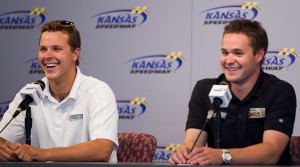
Bayne: It’s been fun for everybody else, not so much for us at times. We have a whole group that does that. It’s not just Ricky and I that keep each other accountable. That’s what’s cool. If we’re both on a high, we know we have four other guys that are going to help us out. And if we’re in the trenches, they’re going to get down in there with us. But for Ricky and I, it’s been opposite. My (high point) happened at the beginning of the year and his is happening right now. But you always want your last race to be your best race. It’s a little bit tough on me right now because I had early success and now it’s been a little bit of a struggle. We’ve been fast but we haven’t had the results. We know we’re going to turn it around. But for Ricky, it’s been cool to watch because he’s gradually gotten better every week. He was at Victory Lane for me and I’ll be at the banquet for him if he wins. We’re just good friends, but if it wasn’t for our faith, I don’t know that we would’ve been as good of friends. God’s definitely the center of both of our lives and that’s why we’re able to be good friends.
Bonham: How sobering was it to see what happened to Reed Sorenson who lost his ride even though he was in contention for the Nationwide title?
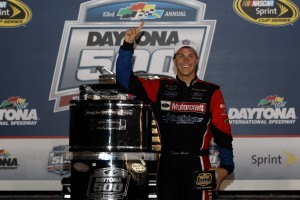
Bayne: That’s why it’s important not to get caught up in those highs. When I won the (Daytona) 500, it was important not to think that’s how it was always going to be, because the reality is it’s not. With the way we live our lives and where our hope is, we would look at that a little differently. It is sobering to see Reed out of a ride, but I know that if I’m out of a ride for some reason, it’s for something else. It’s still tough. You want to be racing and that’s really hard for Reed, but everybody in this sport has a two-week memory span. If you don’t win in the next two weeks, they think you’re running terrible. You can run good early in the year and have a bad rest of the season and they’ll forget about that early win. So you want to be good every weekend. You want to be consistent. You want to be on the top of your game. But when you’re struggling, that’s when your true faith comes in. That’s where perseverance and James 1 comes in. You’ve got to push through it even when you don’t understand what’s going on.
Bonham: Tell me about the Bible study that you attend every Saturday morning with some of the other young Christian drivers on the Nationwide circuit and how it’s impacted some other guys like Josh Wise.
Bayne: It’s awesome. Josh Wise, he’s an awesome guy. Through the group all of our relationships have gotten stronger. Most of the guys in the study are married like (Justin) Allgaier, (Michael) McDowell, Blake (Koch) and Josh. We all hang out at the track and their wives are becoming good friends. It’s cool to see what God does with His people and when He surrounds you with more of His people. For Josh, I remember the first Bible study that he came to. His prayer was so real. It wasn’t some crazy prayer with big words where he was trying to prove that he should be at that Bible study. He’s really seeking and you can see his life changing.
Bonham: How important is it for people to see a story like yours where, like Job in the Bible, life is full of both blessings and hard times?
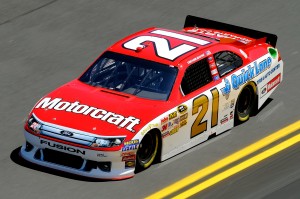
Bayne: (The story of) Job was on my heart right around the time of the (Daytona) 500 and I didn’t know what has about to happen. Just reading how he was willing to surrender to God right after He lost everything was like, wow, that’s true faith right there. Of course later on he struggled with it like we all will at some point, but we’re all going to have struggles. If life was rosy all the time, we wouldn’t need God. We wouldn’t need Jesus. We wouldn’t need anything. Our lives would be perfect, so what would we need Him for? But He’s created these voids for Him to fill. That’s where we have to let Him come in and fill that void and not try to do it with other things. That’s what so tempting in the world. It’s easy to get wrapped up in things or money or girlfriends or whatever and let them fill that void. But until you let Him do it, it’s not going to be as fulfilling. That’s something I’ve been working on for myself. What are the things that I’ve replaced God with? What have I tried to get joy out of? But at the end of the day, you have to realize that God is the only place your joy can come from, and when He gives you things to enjoy, you can.”
Bonham: What kind of feedback do you get from people when you have the opportunity to live our your faith on a very public stage?
Bayne: You get opposite ends. I’ve never wanted to be that guy that stands on the middle ground. In a sense, you get the Kyle Busch reaction. You get the people that love you and you get the people that don’t like you at all. But when people see Christ—and I’m not saying I reflect Him all the time, and I’m probably not as clear of a window as I should be for Him to shine through sometimes—they can’t help but like it, and that’s not me. That’s Him. When I see people around me that are true believers and followers and they live it out, I’m attracted to those people. It’s like Jonathan and David. They became close friends because of their relationship with God. It bonded them. But I don’t want to be legalistic and just surround myself with Christian people. That’s not what we’re called to do. For me, I’m called to be in the racing community where the majority of the people aren’t believers and we’re supposed to share with them. You can go too far one way or go too far the other way. I try to keep a good mixture of being sharpened by followers and going out and trying to reach out to other people.
Bonham: How do you deal with the negative feedback you get from people who don’t think athletes should be vocal about their faith?
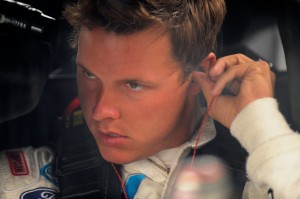
Bayne: I like it. It’s almost like Paul being thrown in prison. It’s not as intense, but he says it’s going to happen. Jesus was crucified for it. So a message board isn’t going to hurt me that bad. I care about what people think, which is probably one of my biggest downfalls. It’s a little bit of pride—building myself up on other people’s opinion. I’ve tried to get rid of that, but it’s still there. I care a lot about what other people think. I don’t just ignore it. But I remember this story. I was on Twitter right after I won the Daytona 500. Obviously I thanked God after the race and this one guy tweeted, “Yeah, it’s easy to thank God when things are good. What about when things are bad?” As soon as I got sick, I remembered that. And I thought, “This might be a chance to reach that one guy,” because He’s still God. He’s still the same. Even at Phoenix, the week after Daytona, I wrecked during practice and I tweeted, “Well, He’s still the same.” I don’t know if that guy saw it or not, but you’ve just got to be consistent.
Bonham: You’ve got to believe that there are probably lots of people out there like that who are cynical about Christian athletes thanking God.
Bayne: Exactly. That’s probably why I’ve experienced such highs and lows. What are we made of? Are we just saying we trust Him because we’re winning? I think that’s how He’s used me.
Bonham: Are you going to be sharing your testimony at MRO chapel services and other venues more often?
Bayne: We do a lot of speaking at different churches. Michael (McDowell) does it more than most of it because he’s not at busy with his teams. He really sets a lot of things up and goes and does it. We’re actually doing the K-Love Cruise in February. I’ll be speaking at that. It’s pretty neat to get the opportunity to share your platform like that. I’m just thankful He’s using me because it could be somebody else.
Keep up with the latest from Trevor Bayne by visiting his official website HERE.
